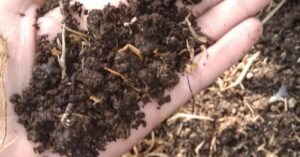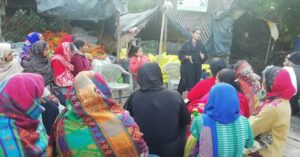In the state of Uttar Pradesh, lies the ancient city of Meerut, lined with buildings that date back to the Indus Valley era. Amidst the bustling city you will find Sana Khan, the owner of SJ Organics, practising vermicomposting, a method that may be as old as the buildings themselves. Sana, an engineer by education, was fascinated by earthworms after taking part in a college project on vermicomposting, which led her to set up her own business.
Sana had always dreamed of becoming a doctor but when she couldn’t clear the medical entrance exams she joined IMS Engineering College in Ghaziabad, Uttar Pradesh to pursue her BTech. During her fourth year at college she had to work on a vermicomposting project prior to which she had no knowledge of the practice.
As Sana began to see the multiple benefits of this method and realised its limited practical application by farmers, she decided to implement her ongoing project on the field. “During the project I became fascinated with and attached to the worms and thought — why not implement this project on a large scale. I started breeding these worms and began commercialising this product,” says Sana.
Vermicomposting is a process of preparing enriched compost with the use of earthworms. Earthworms consume biomass and excrete it in digested form called worm casts, which has been termed as ‘black gold’ due to its nutrient rich properties. Earthworms live upto three years and rapidly reproduce making the process sustainable and cheap. Apart from its growing importance as an integral component of the organic farming system, vermicomposting is also regarded as clean, sustainable and a zero-waste approach as microbes assist earthworms in waste degradation on a large scale.
She adds, “We have interfered in the natural system by adding chemical fertilizers and pesticides that have an adverse effect on our health. However using organic products compliments the natural way of things rather than altering it which is healthy for both the soil and for us.”
A Very Dairy Compost
Initially, when Sana decided to start vermicomposting she was faced with a multitude of challenges. When Sana informed her family of her plans they tried to persuade her against it, as they had no background in agriculture and she had no formal training. Her mother tried to persuade her to take up a corporate job at an MNC, however she eventually found support from her father, a tailor by profession, and her brother.
“My father told me if I wanted to start my own venture I should do it and see where it goes in a year or two. My father always wanted me to pursue whatever I was passionate about, no matter what,” says Sana.

In 2014, at the age of 23, Sana started SJ Organics with the help of her brother, Junaid Khan who helped finance the business. When she started the business, Sana had tied up with dairy owners directly to source the waste generated at their units for a unique method of vermicomposting. However, that business model didn’t work out.
Sana then began employing contractors to bring in the dairy and biodegradable household waste—that they source from the Ghaziabad and Meerut area—to the Government Inter College where she is running a vermicomposting site. This waste is then immediately fed to the red earthworms, a particular type of worm that is highly efficient, that Sana uses for her vermicomposting. The entire process of converting the organic matter into vermicompost takes about a month and a half.
After this, the compost is sieved and enriched with cow urine which acts as a natural pesticide and fertiliser. Each batch of vermicompost is lab tested to meet certification standards and then packaged and marketed. The vermicompost is bought by farmers, retail shops and nurseries. Sometimes farmers bring a soil report and the vermicompost is enriched with additional nutrients as per the soil requirements.
By 2015, Sana started earning profits and began scaling up operations. By 2020, the company received 500 tonnes of waste and produced 150 tonnes of vermicompost per month with an annual turnover of Rs 1 crore. Today, Sana handles production while the marketing side of the business is handled by her brother, Junaid and her husband, Syed Akram Raza.
Taking Vermicompost To The Rest of India
“I had to travel to villages to train farmers in organic farming methods. But the people there would often wonder who I was and not take me seriously,” says Sana about the initial challenges she faced.
Then in 2018, she was featured on the popular show Mann ki Baat hosted by the Prime Minister, for her work as a woman entrepreneur and sustainable initiative that helps farmers in the region. Sana says, “On the 41st episode the PM played a video of me and how vermicompost is made at SJ Organics. Now the farmers take me seriously and are interested in taking up organic farming methods.”
SJ Organics also provides training and consultancy services in setting up low cost infrastructure for vermicomposting. This has set off a chain of employment opportunities. Sana has 10 permanent employees and hires other daily wage workers, providing employment to about 30 people. “We directly help create employment as we hire the thekedaars (contractors) who in turn employ labourers to help load and transport the waste.
At the same time, our training programmes for entrepreneurs help them start their own ventures which further creates employment opportunities for people across the country,” says Sana.

Apart from creating employment opportunities SJ Organics has also helped popularise vermicomposting. Across Meerut 104 schools have set up vermicomposting sites under the consultancy of SJ Organics. Sana hopes that by sharing her knowledge of vermicomposting she can help other entrepreneurs popularise organic farming methods not just in Uttar Pradesh but all over India.
Talking about her business plans for the future, Sana says she has recently bought a one acre land in Abdullapur on the outskirts of Meerut where she plans to expand production and also produce new products like vermi wash.
Signing off with a message for women entrepreneurs, Sana says, “There’s a myth that women can only do household work. Women shouldn’t shy away from entering the agriculture industry, there is immense scope and plenty of opportunities. Women can reach any heights they want. It would be a boon for our economy if more women actively enter the agriculture sector.”
Edited by Yoshita Rao
No comments:
Post a Comment